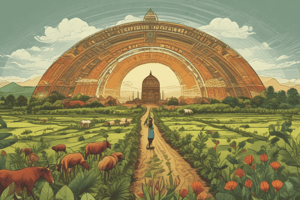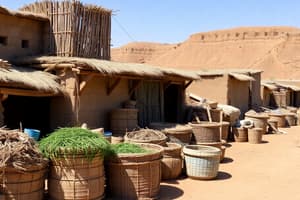Podcast
Questions and Answers
What is the primary definition of agriculture?
What is the primary definition of agriculture?
- Gathering wild food
- Hunting animals
- The art of fishing
- Cultivation of land (correct)
Agriculture plays no significant role in the economic development of countries.
Agriculture plays no significant role in the economic development of countries.
False (B)
Name one physical factor that affects agriculture.
Name one physical factor that affects agriculture.
Relief or Climate
Agriculture provides a huge market for products such as __________, fertilizers, and pesticides.
Agriculture provides a huge market for products such as __________, fertilizers, and pesticides.
Match the following agricultural benefits with their descriptions:
Match the following agricultural benefits with their descriptions:
Which of the following is NOT a factor affecting agriculture?
Which of the following is NOT a factor affecting agriculture?
Ancient civilizations relied solely on agriculture for their survival.
Ancient civilizations relied solely on agriculture for their survival.
What is one major reason why plains are more suitable for agriculture than highlands?
What is one major reason why plains are more suitable for agriculture than highlands?
Which type of agriculture is characterized by the movement of people and their animals in search of food?
Which type of agriculture is characterized by the movement of people and their animals in search of food?
Shifting agriculture is also known as slash and burn agriculture.
Shifting agriculture is also known as slash and burn agriculture.
What are the main livestock animals reared in nomadic herding?
What are the main livestock animals reared in nomadic herding?
___ agriculture relies on high output per unit of land in densely populated areas.
___ agriculture relies on high output per unit of land in densely populated areas.
In which regions is nomadic herding commonly practiced?
In which regions is nomadic herding commonly practiced?
Match the type of subsistence agriculture with its characteristic:
Match the type of subsistence agriculture with its characteristic:
Jhumming is a method of intensive subsistence agriculture.
Jhumming is a method of intensive subsistence agriculture.
What types of crops are commonly grown in shifting agriculture?
What types of crops are commonly grown in shifting agriculture?
Which of the following countries is the largest milk producer in the world?
Which of the following countries is the largest milk producer in the world?
Mixed farming involves rearing animals along with cultivating land.
Mixed farming involves rearing animals along with cultivating land.
Name one major type of livestock commonly raised on ranches.
Name one major type of livestock commonly raised on ranches.
Rice is primarily cultivated in __________ and is the second largest producer globally.
Rice is primarily cultivated in __________ and is the second largest producer globally.
What type of crops includes rice, wheat, and maize?
What type of crops includes rice, wheat, and maize?
Dairy farming is a low labor-intensive activity.
Dairy farming is a low labor-intensive activity.
Which soil types are ideal for rice cultivation?
Which soil types are ideal for rice cultivation?
Match the following countries with their respective farming activities:
Match the following countries with their respective farming activities:
What pressure has increased due to population growth?
What pressure has increased due to population growth?
Genetically modified crops have become widely adopted globally.
Genetically modified crops have become widely adopted globally.
What do HYV seeds stand for?
What do HYV seeds stand for?
In developed countries like the USA, agriculture is highly __________.
In developed countries like the USA, agriculture is highly __________.
Match the following features with their corresponding agricultural context:
Match the following features with their corresponding agricultural context:
What advantage do genetically modified crops offer?
What advantage do genetically modified crops offer?
Most of the population in developed countries is engaged in agriculture.
Most of the population in developed countries is engaged in agriculture.
What is one potential environmental benefit of using genetically modified crops?
What is one potential environmental benefit of using genetically modified crops?
Which of the following is considered a natural fibre?
Which of the following is considered a natural fibre?
Jute crops grow well in dry conditions.
Jute crops grow well in dry conditions.
What temperature is ideal for cotton cultivation?
What temperature is ideal for cotton cultivation?
The main cotton-producing states in India include __________.
The main cotton-producing states in India include __________.
Which of the following countries is not known for tea production?
Which of the following countries is not known for tea production?
Match the crops with their ideal temperature range:
Match the crops with their ideal temperature range:
Egypt is known for producing one of the highest quality cotton in the world.
Egypt is known for producing one of the highest quality cotton in the world.
The process by which jute is separated from the stem is called __________.
The process by which jute is separated from the stem is called __________.
What type of soil is known for being fine-grained and fertile, deposited by river water?
What type of soil is known for being fine-grained and fertile, deposited by river water?
Tea is classified as a cereal crop.
Tea is classified as a cereal crop.
Name one nomadic herder group from the Himalayan region.
Name one nomadic herder group from the Himalayan region.
The type of agriculture known as __________ involves clearing land by slashing and burning.
The type of agriculture known as __________ involves clearing land by slashing and burning.
Which type of agriculture focuses on growing a single crop continuously for several years on a large estate?
Which type of agriculture focuses on growing a single crop continuously for several years on a large estate?
Match the following types of soil with their descriptions:
Match the following types of soil with their descriptions:
Clayey soil has a high percentage of large sedimentary material particles.
Clayey soil has a high percentage of large sedimentary material particles.
What is seasonal unemployment?
What is seasonal unemployment?
Flashcards
Agriculture's importance
Agriculture's importance
Agriculture is vital for human survival as it provides food. It also fosters economic development, employment, trade, and international relations.
Agriculture definition
Agriculture definition
Agriculture involves cultivating land, raising crops, raising livestock, forestry and fishing. It is both a science and an art.
Agriculture's role in livelihood
Agriculture's role in livelihood
Agriculture is a primary source of income and employment for a large portion of the global population, especially in developing countries.
Physical factors affecting agriculture
Physical factors affecting agriculture
Signup and view all the flashcards
Importance of plains in agriculture
Importance of plains in agriculture
Signup and view all the flashcards
Role of climate in agriculture
Role of climate in agriculture
Signup and view all the flashcards
Basic human need for agriculture
Basic human need for agriculture
Signup and view all the flashcards
Agriculture's economic impact
Agriculture's economic impact
Signup and view all the flashcards
Subsistence Agriculture
Subsistence Agriculture
Signup and view all the flashcards
Nomadic Herding
Nomadic Herding
Signup and view all the flashcards
Shifting Agriculture
Shifting Agriculture
Signup and view all the flashcards
Intensive Subsistence Agriculture
Intensive Subsistence Agriculture
Signup and view all the flashcards
Commercial Agriculture
Commercial Agriculture
Signup and view all the flashcards
Extensive Agriculture
Extensive Agriculture
Signup and view all the flashcards
Plantation Agriculture
Plantation Agriculture
Signup and view all the flashcards
Livestock Ranching
Livestock Ranching
Signup and view all the flashcards
Ranching
Ranching
Signup and view all the flashcards
Dairy Farming
Dairy Farming
Signup and view all the flashcards
Mixed Farming
Mixed Farming
Signup and view all the flashcards
Cereals
Cereals
Signup and view all the flashcards
Rice Cultivation
Rice Cultivation
Signup and view all the flashcards
Rice Production Leaders
Rice Production Leaders
Signup and view all the flashcards
Organic Farming
Organic Farming
Signup and view all the flashcards
Cotton soil type
Cotton soil type
Signup and view all the flashcards
Cotton temperature
Cotton temperature
Signup and view all the flashcards
Jute soil type
Jute soil type
Signup and view all the flashcards
Tea temperature range
Tea temperature range
Signup and view all the flashcards
Tea rainfall
Tea rainfall
Signup and view all the flashcards
Coffee temperature
Coffee temperature
Signup and view all the flashcards
Coffee soil preference
Coffee soil preference
Signup and view all the flashcards
Jute rainfall needs
Jute rainfall needs
Signup and view all the flashcards
Agricultural Development
Agricultural Development
Signup and view all the flashcards
High-Yield Varieties (HYV) of seeds
High-Yield Varieties (HYV) of seeds
Signup and view all the flashcards
Genetically Modified Crops
Genetically Modified Crops
Signup and view all the flashcards
Biotechnology in Agriculture
Biotechnology in Agriculture
Signup and view all the flashcards
US Farm vs. Indian Farm - Size
US Farm vs. Indian Farm - Size
Signup and view all the flashcards
US Farm vs. Indian Farm - Capital
US Farm vs. Indian Farm - Capital
Signup and view all the flashcards
US Farm vs. Indian Farm - Market
US Farm vs. Indian Farm - Market
Signup and view all the flashcards
US Farm vs. Indian Farm - Labor
US Farm vs. Indian Farm - Labor
Signup and view all the flashcards
Alluvial soil
Alluvial soil
Signup and view all the flashcards
Clayey soil
Clayey soil
Signup and view all the flashcards
Loamy soil
Loamy soil
Signup and view all the flashcards
Seasonal unemployment
Seasonal unemployment
Signup and view all the flashcards
Capital in agriculture
Capital in agriculture
Signup and view all the flashcards
Slash and burn agriculture
Slash and burn agriculture
Signup and view all the flashcards
Study Notes
Agriculture
- Agriculture is the science and art of cultivating land, raising crops, and rearing livestock.
- It is crucial for human survival, providing food and resources.
- Historically, humans relied on hunting and gathering, then transitioned to agriculture, particularly in river valleys.
- Agriculture now involves a range of activities, including forestry and fishing.
Importance of Agriculture
- Most of the world's population relies on agriculture for their livelihood, especially in developing countries.
- It forms the backbone of a country's economic development.
- Agriculture provides food, creates markets for related industries (tractors, fertilizers, etc.), generates employment, reduces poverty, and fosters international trade.
Factors Affecting Agriculture
-
Physical Factors:
- Relief (topography): Plains are more suitable for agriculture than hilly areas, due to easier use of machinery and labor availability.
- Climate: Each crop has specific temperature and rainfall requirements, affecting crop patterns (e.g., wheat in temperate regions, rice in tropical regions).
- Soil: Soil fertility and composition affect crop yields; different crops thrive in different soil types (e.g., alluvial, black soils).
-
Economic Factors:
- Size of land holdings: Smaller farms are often less economically viable due to fragmentation of land.
- Labour: Availability of labor is crucial, influencing cropping patterns.
- Capital: Investment in inputs like high-yield seeds, irrigation, fertilizers, and machinery significantly affects crop yields.
Types of Agriculture
-
Subsistence Agriculture:
- Nomadic Herding: Pastoralists who move with their livestock in search of pasture
- Shifting Agriculture: Clearing land for cultivation and moving on to a new plot when fertility declines (slash-and-burn method).
- Intensive Subsistence Agriculture: High output per unit of land, common in densely populated parts of Asia, with intensive use of land and manual labor.
-
Commercial Agriculture:
- Extensive Agriculture: Large farms in sparsely populated regions, with lower yield per hectare but large-scale production.
- Plantation Agriculture: Large-scale cultivation of a single crop for distant markets, typically in tropical areas.
- Livestock Ranching: Commercial grazing of livestock; characteristic of large tracts of land in temperate areas.
- Dairy Farming: Specializing in milk production; labour-intensive activity.
Major Crops
- Cereals: Rice, wheat, maize (corn), millets (e.g., jowar, bajra, ragi).
- Fibre Crops: Cotton, jute.
- Beverage Crops: Tea, coffee.
Major Agriculture Development
- Increased population pressure and demand for food have led to an increase in agricultural productivity.
- Innovations and technology (e.g., HYV seeds, fertilizers, mechanization) have dramatically increased yields.
- Genetically modified crops (GM crops) have contributed to further agricultural advancements, however there are criticisms regarding their environmental impact.
- Developed agricultural practices vary in developed and developing countries, reflecting differences in capital, labor, and technology.
Studying That Suits You
Use AI to generate personalized quizzes and flashcards to suit your learning preferences.




